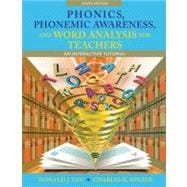
Donald J. Leu and Charles K. Kinzer are highly regarded experts in the field of literacy instruction and technology in literacy teaching and learning.
Donald Leu is John and Maria Neag Endowed Chair in Literacy and Technology, Professor of Education, and Director of New Literacies Research Lab at the University of Connecticut.
Charles K. Kinzer is Professor of Education and Technology and Coordinator, Program in Communication, Computing and Technology in Education at Teachers College, Columbia University.
Contents
| Preface |
| 1. Recognizing Words: Helping Children Develop Word Analysis Strategies |
| Phonological Awareness |
| Phonemic Awareness |
| Phonics |
| Context Use |
| Sight Word Knowledge |
| Morphemic Analysis |
| Chunking Words |
| Dictionary Skills |
| Developmental Spelling Patterns |
| The Journey Ahead |
| Practical Resources for Teaching Word Analysis in Your Classroom |
| Self-Check for Chapter One |
| Online Reading Resources |
| 2. The Early Stages: Phonological and Phonemic Awareness |
| Practical Resources for Teaching Phonological and Phonemic Awareness in Your Classroom |
| Self-Check for Chapter Two |
| Online Reading Resources |
| 3. Phonics: Onset, Rime, and Consonant Patterns |
| Onset: Initial Consonant Letters |
| Rime |
| Table 1 The 37 Most Common Rime Patterns |
| Consonant Patterns |
| Practical Resources for Teaching Phonics (Onset, Rime, and Consonant Patterns in Your Classroom |
| Self-Check for Chapter Three |
| Online Reading Resources |
| 4. Phonics: Vowels |
| Single Vowels |
| Vowel Clusters |
| Vowel Generalizations |
| Practical Resources for Teaching Phonics (Vowel Patterns) in Your Classroom |
| Self-Check for Chapter Four |
| Online Reading Resources |
| 5. Context |
| The Importance and Use of Context |
| Using Context to Check Word Analysis |
| Using Context with Other Word Analysis Techniques |
| Using Context as a Basic Word Analysis Technique to Determine Meaning |
| Limitations of the Use of Context Clues |
| Practical Resources for Teaching Context Skills in Your Classroom |
| Self-Check for Chapter Five |
| Online Reading Resources |
| 6. Sight Words |
| The Development of Sight Word Knowledge |
| Figure 1 Dolch list of basic sight words |
| Practical Resources for Teaching Sight Words in Your Classroom |
| Self-Check for Chapter Six |
| Online Reading Resources |
| 7. Morphemic Analysis |
| Understanding Affixes |
| Practical Resources for Teaching Morphemic Analysis in Your Classroom |
| Self-Check for Chapter Seven |
| Online Reading Resources |
| 8. Chunking Words into Smaller Units: Syllabication and Structural Analysis |
| Syllabication |
| Self-Check for Syllabication |
| Using Syllabication to Help with Pronunciation |
| Practical Resources for Teaching Chunking Skills in Your Classroom |
| Self-Check for Chapter Eight |
| Online Reading Resources |
| 9. Using the Dictionary |
| Locating Words in a Dictionary |
| Using a Dictionary to Help Determine Pronunciation |
| Using a Dictionary to Help Determine Meaning |
| Practical Resources for Teaching Dictionary Skills in Your Classroom |
| Self-Check for Chapter Nine |
| Online Reading Resources |
| 10. Developmental Spelling Patterns: Insights into the Development of Word Analysis Skills |
| Figure 1 The Leu and Kinzer developmental spelling checklist |
| The Precommunicative Phase |
| Figure 2 An example of a child’s writing from the precommunicative phase |
| The Semiphonetic Phase |
| Figure 3 An example of a child’s writing from the semiphonetic phase |
| The Phonetic Phase |
| Figure 4 An example of a child’s writing from the phonetic phase |
| The Transitional Phase |
| Figure 5 An example of a child’s writing from the transitional phase |
| The Standard Phase |
| Figure 6 An example of a child’s writing from the standard phase |
| Practical Resources for Understanding Developmental Spelling Patterns in Your Classroom |
| Self-Check for Chapter Ten |
| Online Reading Resources |
| Posttest I |
| Posttest II |
| References |
The New copy of this book will include any supplemental materials advertised. Please check the title of the book to determine if it should include any access cards, study guides, lab manuals, CDs, etc.
The Used, Rental and eBook copies of this book are not guaranteed to include any supplemental materials. Typically, only the book itself is included. This is true even if the title states it includes any access cards, study guides, lab manuals, CDs, etc.